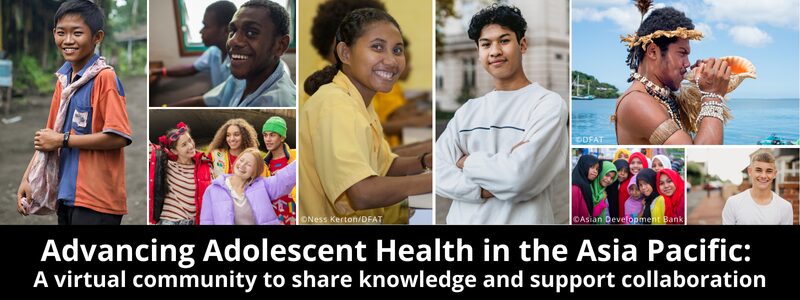Introducing a monthly seminar series

Advancing Adolescent Health in the Asia Pacific: A virtual community to share knowledge and support collaboration
Adolescence is a critical developmental period where health determines developmental trajectories and outcomes during adolescence itself, into adulthood and into the next generation. More than half of the global population of adolescents lives in the Asia Pacific region. Yet globally, regionally and indeed locally in Australia, there are major unmet health needs, inadequate investments in responsive systems, and insufficient research and translation capacity in adolescent health.
Advancing Adolescent Health in the Asia Pacific: A virtual community to share knowledge and support collaboration is an opportunity to come together to share knowledge, showcase new findings and/or research methods with the overarching objective of helping to build capacity in the Asia Pacific region, including Australia, to improve adolescent health and wellbeing.
This seminar series aims to provide researchers, policy makers, practitioners, implementers, young advocates – indeed anyone interested in the health and wellbeing of adolescents – opportunities to enhance their understanding of adolescent health and wellbeing, with a focus on research.
This monthly series is supported by the Centre of Research Excellence (CRE) for Driving Global Investment in Adolescent Health. Funded by the Australian National Health and Medical Research Council, the CRE is focused on defining the health needs of adolescents to deliver research that drives investment in neglected areas of adolescent health including mental health, non-communicable disease risk, injury and violence and substance use. Led by a team at the Centre for Adolescent Health, Murdoch Children’s Research Institute it brings together leading Australian research groups including the University of Melbourne, Burnet Institute, University of New South Wales, University of South Australia, University of Queensland, and the South Australian Health and Medical Research Institute. These researchers have multiple relationships with academics, policy makers, clinicians and advocates across the Asia Pacific region. Learn more about the CRE here.
Upcoming seminars
Global launch of A Call to Action: The Second Lancet Commission on Adolescent Health and Wellbeing
A call to action: the global launch of the second Lancet commission on adolescent health and wellbeing will take place as a side event to the World Health Assembly 2025. Please complete this Expression of Interest form to be considered for attendance.
Past seminars with recordings
Non-communicable diseases and wellbeing in Indonesian Adolescents: engaging young people in the response
3 Apr, 1:00 to 2:00 pm AEDT
This seminar discusses the prevalence and co-occurrence of distinct NCD risk factors, how they relate to current mental wellbeing amongst adolescents in Indonesia, and what this means for tackling the rising burden of NCDs in the Asia Pacific.
Global, regional, and national prevalence of child and adolescent overweight and obesity, 1990–2021, with forecasts to 2050
13 Mar, 1:00 to 2:00 pm AEDT
In this session, Dr. Jess Kerr and Prof. Dot Dumuid will unveil groundbreaking data on overweight and obesity trends among 15-24 year-olds across 204 countries, with a special focus on the Asia-Pacific region.
Moving beyond data gaps
13 Feb, 1:00 to 2:00 pm AEDT
In this session, Professor Pete Azzopardi will provide a broad overview of the state of primary data for adolescent health, highlighting key knowledge gaps and the implications this has had for policy and practice.
Adolescent injury burden and prevention
6 June, 1:00 to 2:00 pm AEST
This seminar will examine the work of the injury stream of the CRE to quantify the global burden of injury and interpersonal violence experienced by adolescents, uncover the evidence to support investment in effective interventions, as well as the gaps.
Building capacity for global adolescent health
4 July, 1:00 to 2:00 pm AEST
This workshop style session will discuss the need for high-quality, youth-informed research to help drive investment in global adolescent health and highlight some of the CRE’s goals for building capacity for youth involvement in research.
From Surviving to Thriving: The Global Movement Starts Shifting
1 August, 1:00 to 2:00 pm AEST
This seminar will discuss the global movement from surviving to thriving, emphasizing the need to measure adolescent wellbeing and enable the understanding of current gaps and progress made.